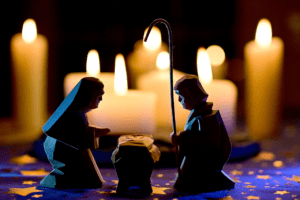Exodus 16: 2-4, 12-15, 31 (RM) or 2-4, 9-15 (RCL); Psalm 78; Ephesians 4: 17, 20-24 (RM) or 1-16 (RCL); John 6: 24-35.
It‘s hard to think of anyone who actually likes complaining, or not getting their way. Or not getting their questions answered the way they want.
Little children certainly don’t like it, and will pull a screaming temper tantrum when their frustration goes out of control. Teenagers, well, it goes without saying. I’m thinking of a friend of mine, a mother of five who, during a job interview, was asked if she could deal with oppositional behaviour. She exclaimed, “Are you kidding? I’m the mother of five teenagers!”
And it can happen that older people don’t either. I’m smiling, thinking of a now-deceased German woman from my Ottawa church, who was expelled from a nursing home. The exasperated staff told her daughter, “She won’t cooperate. All she says is ‘Nein! Nein! Nein!’”
God help me, there’s a part of me that wants to go into old age just that feisty! 😉
We find both in our readings for this Sunday – stiff-necked oppositional resistance on the one hand and a cautiously cooperative “What do you want us to do?” on the other. And the unlikely thread that holds them together is the image of “manna.” Manna is an Aramaic word that means, “What is it?” Really, that’s what it means. “Whazzat?” “What’s this stuff?”
The First Reading opens with the hungry Israelites in the desert, grumbling, again. They grouched at Moses, “We’d have been better off in Egypt eating pot roast” (yes that’s what is meant in this translation by fleshpots: roasted meat or stew. Not what you might have been tempted to think…)
Moses promises them that God will provide them with meat and bread. At night, migrating quail swoop down on the encampment and the weary pilgrims catch and roast enough to eat their fill. And of course in the morning something very odd appears on the ground. “What is it?” Do you know what it apparently was? At night the tamarisk tree, common in that desert region, secretes a sort of sap, rather like maple sap, that forms a sugary flaky substance on the ground. These flakes can be harvested to make a syrupy beverage.
In the Gospel the crowd reminds Jesus of the sign given by Moses of God’s powerful work in the provision of manna in the desert, and they ask him, ”OK, what kind of sign can you show us?” Notice, this story follows the generously overflowing meal of bread and fish that fed more than five thousand — as if they needed another sign from God. They even ask, “What can we do to make this happen?” as if it were within their own power to pull off a miracle, if they only cooperate.
Jesus points past Moses, to God the origin of all sustenance and all life:
“For the bread of God is that which comes down from heaven and gives life to the world.”
They respond by asking him to give them “this bread, always.” And Jesus answers by saying,
“I am the bread of life. Whoever comes to me shall not hunger, and whoever believes in me shall not thirst.”
Here is where this week’s Gospel stops. It’s a lovely ending. This can be read as a rich, meaningful metaphor: Jesus identifying himself as the bread of life. You can say that this means his teaching gives life by giving wisdom, spiritual nourishment, and a source of mental strength to deal with whatever happens … and then break off the conversation, or put down the book, and walk away.
It’s not that easy. Jesus doesn’t let anyone off that easily.
In next week’s Gospel we’ll see a much stronger emphasis on Jesus as the bread come down from heaven – and even more oppositional behaviour.
© Susan K. Roll
This Reflection has been edited from that of August 1, 2021.
Susan Roll retired from the Faculty of Theology at Saint Paul University, Ottawa, in 2018, where she served as Director of the Sophia Research Centre. Her research and publications are centred in the fields of liturgy, sacraments, and feminist theology. She holds a Ph.D. from the Catholic University of Leuven (Louvain), Belgium, and has been involved with international academic societies in liturgy and theology, as well as university chaplaincy, Indigenous ministry and church reform projects.





In my life, I often enough say the equivalent of “what kind of sign can you show us?” – not noticing the many signs all around me to which I am blinded. I pray for eyes that see ever more deeply.